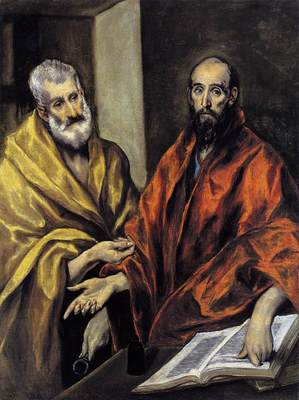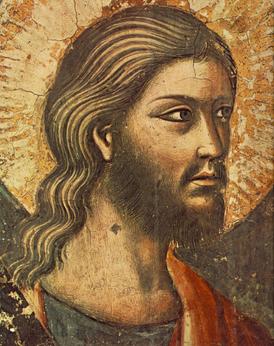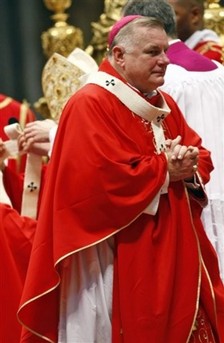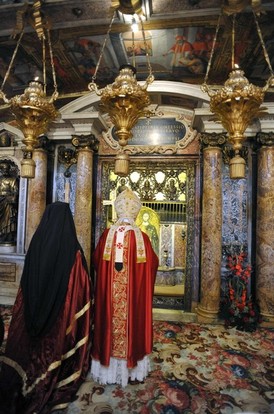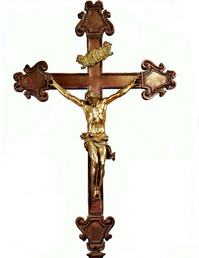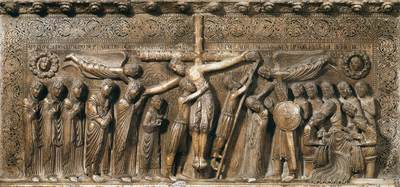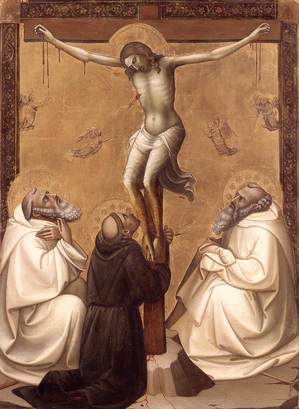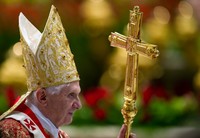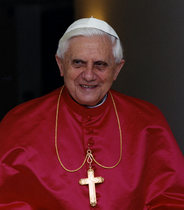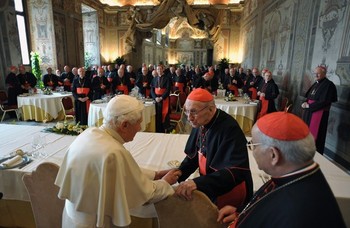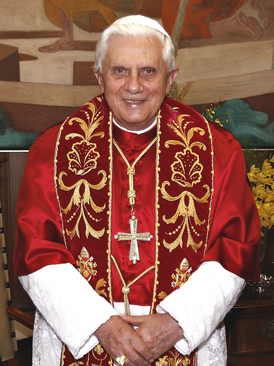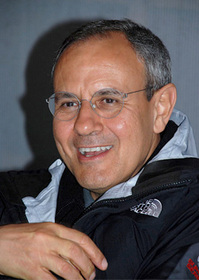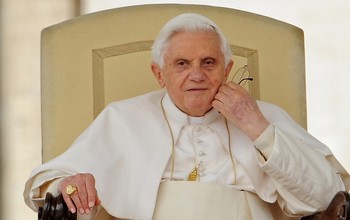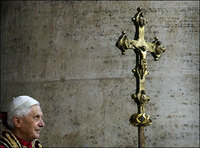Though they suffered on different days, Saints Peter and Paul are known as one, as Saint Augustine reminds.
In first hearing and then reading the papal homily I noticed some very crucial points for us to reflect upon and to seriously consider: the real persecution of the Church today and the impact on Catholic identity exists not exclusively from outside the Church (a theme the pope has stated before now) but from the faithful’s betrayal of the faith, of Truth. When secularism, not to be confused with secularity, infiltrates the Church the true message of the Gospel is obscured and our hearts are darkened.
As usual on today’s solemn feast of Peter and Paul, Pope Benedict bestowed the pallium, the symbol of theological, juridical and fraternal communion between the pope and a bishop. It is also a symbol of the “fullness of charity and unity.” In seeing the pallium we see, as Benedict says, a symbol of “the guarantee of freedom for the Church’s Pastors and the Communities.” Today, 38 archbishops from around the world received the pallium, including three archbishops from the USA and one from Canada.
The Pope’s exhortation and prayer upon giving the pallium:
To the glory of God and the praise of the Blessed Virgin Mary and of the apostles Peter and Paul, and of the Holy Roman Church, for the honor of the Churches, which have been placed in your care, and as a symbol of your authority as metropolitan archbishop: We confer on you the pallium taken from the tomb of Peter to wear within the limits of your ecclesiastical provinces.
And then
May this pallium be a symbol of unity and a sign of your communion with the Apostolic See, a bond of love, and an incentive to courage. On the day of the coming and manifestation of our great God and chief shepherd, Jesus Christ, may you and the flock entrusted to you be clothed with immortality and glory. In the name of the Father, and of the Son and of the Holy Spirit.
Below is Benedict’s homily for today’s Mass (with my own points of emphasis).
The biblical
texts of this Eucharistic Liturgy of the Solemnity of Saints Peter and Paul, in
their great wealth, highlight a theme that could be summarized thus: God is
close to his faithful servants and frees them from all evil, and frees the
Church from negative powers. It is the theme of the freedom of the Church,
which has a historical aspect and another more deeply spiritual one.
This theme
runs through today’s Liturgy of the Word. The first and second readings speak,
respectively, of St Peter and St Paul, emphasizing precisely the liberating
action of God in them. Especially the text from the Acts of the Apostles
describes in abundant detail the intervention of the Angel of the Lord, who
releases Peter from the chains and leads him outside the prison in Jerusalem,
where he had been locked up, under close supervision, by King Herod (cf. at
12.1 to 11). Paul, however, writing to Timothy when he feels close to the end
of his earthly life, takes stock which shows that the Lord was always near him
and freed him from many dangers and frees him still by introducing him into His
eternal Kingdom (see 2 Tim 4, 6-8.17-18). The theme is reinforced by the
Responsorial Psalm (Ps 33), and also finds a particular development in the
Gospel of Peter’s confession, where Christ promises that the powers of hell
shall not prevail against his Church (cf. Mt 16:18).
Observing closely we note
a certain progression regarding this issue. In the first reading a specific
episode is narrated that shows the Lord’s intervention to free Peter from
prison. In the second Paul, on the basis of his extraordinary apostolic
experience, is convinced that the Lord, who already freed him “from the
mouth of the lion “delivers him” from all evil”, by opening the
doors of Heaven to him. In the Gospel we no longer speak of the individual
Apostles, but the Church as a whole and its safekeeping from the forces of
evil, in the widest and most profound sense. Thus we see that the promise of
Jesus – “the powers of hell shall not prevail” on the Church – yes,
includes the historical experience of persecution suffered by Peter and Paul
and other witnesses of the Gospel, but it goes further, wanting to protect
especially against threats of a spiritual order, as Paul himself writes in his
Letter to the Ephesians: ” For our struggle is not with flesh and blood
but with the principalities, with the powers, with the world rulers of this
present darkness, with the evil spirits in the heavens”(Eph 6:12).
Indeed,
if we think of the two millennia of Church history, we can see that – as the
Lord Jesus had announced (cf. Mt 10.16-33) – Christians have never been lacking
in trials, which in some periods and places have assumed the character of real
persecution. These, however, despite the suffering they cause, are not the
greatest danger for the Church. In fact it suffers greatest damage from what
pollutes the Christian faith and life of its members and its communities,
eroding the integrity of the Mystical Body, weakening its ability to prophesy
and witness, tarnishing the beauty of its face. This reality is already
attested in the Pauline Epistle. The First Epistle to the Corinthians, for
example, responds to some problems of divisions, inconsistencies, of infidelity
to the Gospel which seriously threaten the Church. But the Second Letter to
Timothy – of which we heard an excerpt – speaks about the dangers of the
“last days”, identifying them with negative attitudes that belong to
the world and can infect the Christian community: selfishness, vanity, pride,
love of money, etc. (cf. 3.1 to 5). The Apostle’s conclusion is reassuring: men
who do wrong – he writes – “will not make further progress, for their
foolishness will be plain to all” (3.9). There is therefore a guarantee of
freedom promised by God to the Church, it is freedom from the material bonds
that seek to prevent or coerce mission, both through spiritual and moral evils,
which may affect its authenticity and credibility.
The theme of the freedom of
the Church, guaranteed by Christ to Peter, also has a specific relevance to the
rite of the imposition of the pallium, which we renew today for thirty-eight
metropolitan archbishops, to whom I address my most cordial greeting, extending
with it affection to all who have wanted to accompany them on this pilgrimage.
Communion with Peter and his successors, in fact, is the guarantee of freedom
for the Church’s Pastors and the Communities entrusted to them. It is
highlighted on both levels in the aforementioned reflections. Historically,
union with the Apostolic See, ensures the particular Churches and Episcopal
Conferences freedom with respect to local, national or supranational powers,
that can sometimes hinder the mission of the ecclesial Church. Furthermore, and
most essentially, the Petrine ministry is a guarantee of freedom in the sense
of full adherence to truth and authentic tradition, so that the People of God
may be preserved from mistakes concerning faith and morals. Hence the fact that
each year the new Metropolitans come to Rome to receive the pallium from the
hands of the Pope, must be understood in its proper meaning, as a gesture of
communion, and the issue of freedom of the Church gives us a particularly
important key for interpretation. This is evident in the case of churches
marked by persecution, or subject to political interference or other hardships.
But this is no less relevant in the case of communities that suffer the
influence of misleading doctrines or ideological tendencies and practices
contrary to the Gospel. Thus the pallium becomes, in this sense, a pledge of
freedom, similar to the “yoke” of Jesus, that He invites us to take
up, each on their shoulders (Mt 11:29-30). While demanding, the commandment of
Christ is “sweet and light” and instead of weighing down on the bearer,
it lifts him up, thus the bond with the Apostolic See – while challenging –
sustains the Pastor and the portion of the Church entrusted to his care, making
them freer and stronger.
I would like to draw a final point from the Word of
God, in particular from Christ’s promise that the powers of hell shall not
prevail against his Church. These words may also have a significant ecumenical
value, since, as I mentioned earlier, one of the typical effects of the Devil
is division within the Church community. The divisions are in fact symptoms of
the power of sin, which continues to act in members of the Church even after
redemption. But the word of Christ is clear: ” Non praevalebunt – it will
not prevail” (Matt. 16:18). The unity of the Church is rooted in its union
with Christ, and the cause of full Christian unity – always to be sought and
renewed from generation to generation – is well supported by his prayer and his
promise. In the fight against the spirit of evil, God has given us in Jesus the
‘Advocate’, defender, and after his Easter, “another Paraclete” (Jn
14:16), the Holy Spirit, which remains with us always and leads the Church into
the fullness of truth (cf. Jn 14:16; 16:13), which is also the fullness of
charity and unity. With these feelings of confident hope, I am pleased to greet
the delegation of the Patriarchate of Constantinople, which, in the beautiful
custom of reciprocal visits, participates in the celebrations of the patron
saints of Rome. Together we thank God for progress in ecumenical relations
between Catholics and Orthodox, and we renew our commitment to generously
reciprocate to God’s grace, which leads us to full communion.
Dear friends, I
cordially greet all of you: Cardinals, Brother Bishops, Ambassadors and civil
authorities, in particular the Mayor of Rome, priests, religious and lay
faithful. Thank you for your presence. May the Saints Peter and Paul help you
to grow in love for the holy Church, the Mystical Body of Christ the Lord and
messenger of unity and peace for all men. May they also help you to offer the
hardships and sufferings endured for fidelity to the Gospel with joy for her
holiness and her mission. May the Virgin Mary, Queen of Apostles and Mother of
the Church, always watch over you and especially over the Ministry of
metropolitan archbishops. With her heavenly help may you always live and act in
that freedom that Christ has won for us. Amen.
